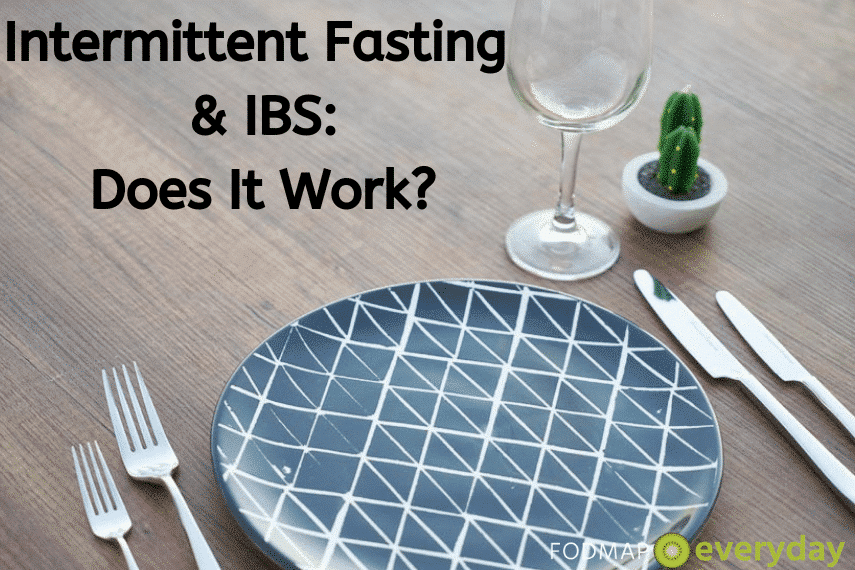Intermittent Fasting: Is It Helpful for IBS?
Intermittent Fasting has gained popularity in the past several years with health claims ranging from weight reduction, longevity, improved gut integrity, blood pressure, cholesterol levels, blood sugars, and more.
Both the Fast Diet by Michael Mosley, MD and Mimi Spencer and Dr. Jason Fung’s books, The Obesity Code: Unlocking the Secrets of Weight Loss and The Diabetes Code: Prevent and Reverse Type 2 Diabetes Naturally have further exploited the fasting trend.
Fasting is not a new phenomenon; it has been practiced for centuries across the world, many religions practice forms of fasting as seen with Ramadan, Yom Kippur, and Lent.

There are dozens of Internet-based articles and personal blogs touting the benefits of Intermittent Fasting for IBS symptom relief, but is this really worth trying?
So What Exactly is Intermittent Fasting?
Intermittent Fasting can be defined as restricting food and calorie containing beverages from a few hours to several days. The three most common versions of intermittent fasting are:
- Alternate Day Fasting: You eat every other day and fast on the alternate days.
- Modified Fasting: Commonly seen as the 5:2 Diet where one eats normally five days and only consumes 500-600 calories on two non-consecutive days each week.
- Time Restricted Eating: Eating is restricted within a specified time window. The most popular being the 16/8 fast, when you only eat between the hours of 12pm and 8pm. Or an overnight fast when one fasts for 12 hours at night starting after dinner.
Is There Any Evidence That Fasting Improves IBS?
There is only one clinical study that took place in Japan 2007 investigating the effects of a several day fast on IBS symptoms.
Here are the details of this study:
- Fifty-eight patients with moderate to severe IBS were enrolled.
- Thirty-six patients went on a ten-day water fast, plus a little bit of nutrition delivered directly into their veins.
- The other twenty-two patients were given basic treatment, which was defined as medications and brief psychotherapy.
The Results:
- The fasting group had significant improvements with seven out of eight IBS symptoms including abdominal pain, abdominal distention, diarrhea, decreased appetite, nausea, anxiety, and quality interference with life.
- The other group who consumed a regular diet (not a low FODMAP diet) plus basic treatment reported improvements in three of these eight symptoms. These were abdominal pain, abdominal distention, and quality interference with life.
After the fast the patients were slowly fed ~300 to 2100 calories a day to prevent refeeding syndrome, a very serious metabolic complication causing electrolyte and fluid shifts that can occur when reintroducing food in a malnourished individual. One is at risk if they are without food for seven days or more. (1)
My opinion is that this approach is not worth the risk, and it would require serious medical oversight and not attainable on one’s own. There are no other studies involving IBS and fasting.
NICE Diet Recommendations for IBS
Sometimes doctors and dietitians counsel with more broad stroke recommendations including the NICE (The National Institute for Health and Care Excellence) guidelines before recommending the low FODMAP diet for the management of IBS.
The NICE diet may be more appropriate for individuals who cannot adopt a restrictive diet or require more basic diet modifications. There is evidence that both the NICE guidelines and the low FODMAP are effective at reducing IBS symptoms.
Here are a few of the NICE guidelines for IBS:
- Eat regular meals and take time to eat.
- Avoid missing meals or leaving long gaps between eating.
I would venture to say that intermittent fasting does not meet these guidelines.
Looking for a low FODMAP experienced dietitian? Check out our RDN Directory here.
Why Intermittent Fasting is Not Encouraged by Registered Dietitians For IBS Patients
- There is inadequate scientific evidence of the long-term safety and side effects of intermittent fasting for IBS and other health concerns.
- We do not know the impact of intermittent fasting on the gut microbiome, which plays an integral role in our digestive health.
- In between fasting it is easier to stack high FODMAP foods and consume larger portions with shorter eating windows, which may worsen IBS symptoms.
- High FODMAP foods are highly fermentable, smaller portions spread out throughout the day may result in less noticeable gas since the body has extra time to move the gas through resulting in less bloating and abdominal pain.
- Many reported increased hunger on fasting days, making this dietary intervention challenging to implement for the short and long-term.
- Fasting can negatively affect athletic performance; this varies based on your level of training.
- Fasting can contribute to abnormal menstrual cycles.
- Intermittent fasting can negatively affect your social life, mealtime with family and friends, work performance, contribute to some social isolation, increase risk of binge eating disorders, and food obsession.

Paying Attention to Meal Timing May Be Helpful
A recent study showed better results on weight loss and metabolic factors with earlier feeding times to match circadian rhythms, such as an 7am-3pm eating window, however, more research is needed on ideal meal timing. (2)
Our circadian rhythms play a role in both the development and severity of IBS, which are worsened by irregular eating times. Our gut is at peak performance in regards to motility, gastric emptying and stomach blood flow during daylight hours. (3)
Reasons When Intermittent Fasting May be Helpful
- You are not consuming any food for a long stretch of time, therefore you are not consuming any FODMAPs.
- Fasting or going long periods of time between meals allows our migrating motor complex (MMC) to be more efficient and this is sometimes compromised in those suffering with IBS. The MMC helps to sweep clean our GI tract from undigested food and bacteria.
- Several studies suggest fasting improves microbial diversity initially, however we lack sufficient evidence that strongly suggests fasting in humans improves our gut microbiome. (4). The bottom line is that we do not know the long-term effects of fasting on our gut health.
- Fasting may improve autophagy, the detox process that rids the body of damaged cells which is believed to help slow the aging process.(5)
- Fasting can have beneficial effects on weight loss and metabolic health including insulin resistance and cardiovascular disease, however fasting regimens fair the same as continuous energy restriction (reduced calorie diets) in the long run. (6,7,8).
- Some people find intermittent fasting an easier approach to weight loss versus other traditional weight loss methods.
As a RDN I always want to provide evidence-based nutrition recommendations that are sustainable, realistic, and tailored to my patient’s individual needs. Many cannot imagine practicing intermittent fasting forever, aside from concerns noted above it is hard to time all meals perfectly – think social obligations, vacations, not to mention all the time spent obsessing over meal planning!
Intermittent fasting can be very challenging to undertake solo and can pose many health concerns. It is highly recommended to talk to your health professional before adopting a fasting regimen especially if one has diabetes, since insulin and oral hypoglycemic agents increase risk of low blood sugars or serious diabetic complications.
Fasting is contraindicated if one is underweight, has a history or current eating disorder, is pregnant, an adolescent, advanced age, or has any serious medical concerns. If you decide to try intermittent fasting, please consult with both your physician and find a RD (preferably with FODMAP knowledge as well) who can provide guidance.
References:
- Ayse L. Mindikoglu, Antone R. Opekun, Sood K. Gagan, and Sridevi Devaraj. Effects of fasting therapy on irritable bowel syndrome. International Journal of Behavioral Medicine13(3):214-20.September 2006
- Elizabeth F.Sutton, Robbie Beyl, Kate S.Early, William T.Cefalu, Eric Ravussin, Courtney M.Peterson. Early Time-Restricted Feeding Improves Insulin Sensitivity, Blood Pressure, and Oxidative Stress Even without Weight Loss in Men with Prediabetes. Cell Metabolism. Volume 27, Issue 6, 5 June 2018, Pages 1212-1221.e3
- Pilar Codoñer-Franch, Marie Gombert.World J Gastroenterol. Circadian rhythms in the pathogenesis of gastrointestinal diseases. Oct 14, 2018; 24(38): 4297-4303
- 4. Marlene Remely,Berit Hippe, Isabella Geretschlaeger, Sonja Stegmayer, Ingrid Hoefinger, and Alexander Haslberger. Increased gut microbiota diversity and abundance of Faecalibacterium prausnitzii and Akkermansia after fasting: a pilot study; Wiener klinische Wochenschrift. Volume 127, Issue9–10, pp 394–39(9-10): 394–398. May 2015.
- Mehrdad Alirezaei, Christopher C. Kemball, Claudia T. Flynn,1 Malcolm R. Wood, J. Lindsay Whitton, and William B. Kiosses.Short-term fasting induces profound neuronal autophagy. Autophagy. 2010 August;6(6): 702-10
- Leanne Harris, Sharon Hamilton, Liane Azevedo, Joan Olajide, Caroline De Brún:Gillian Waller, Vicki Whittaker, Tracey Sharp, Mike Lean,Catherine Hankey, and Louisa Ells. Intermittent fasting interventions for treatment of overweight and obesity in adults: a systematic review and meta-analysis . JBI Database of Systematic Reviews and Implementation Reports. 16(2):507–547, FEB 2018
- Ruth E. Patterson and Dorothy D. Sears. Effects of Intermittent Fasting. Annual Review of Nutrition. Volume 37:371-393. July 2017.
- Michelle Headland, Peter Clifton, Sharayah Carter, and Jennifer B. Keogh. Weight-Loss Outcomes: A Systemic Review and Meta-Analysis of Intermittent Energy Restriction Trials Lasting a Minimum of 6 Months. 8(6): 354. June 2016.









What does “reasons when…” mean?
The list that follows “Reasons When” describes situations when intermittent fasting, if you have IBS, might be considered.